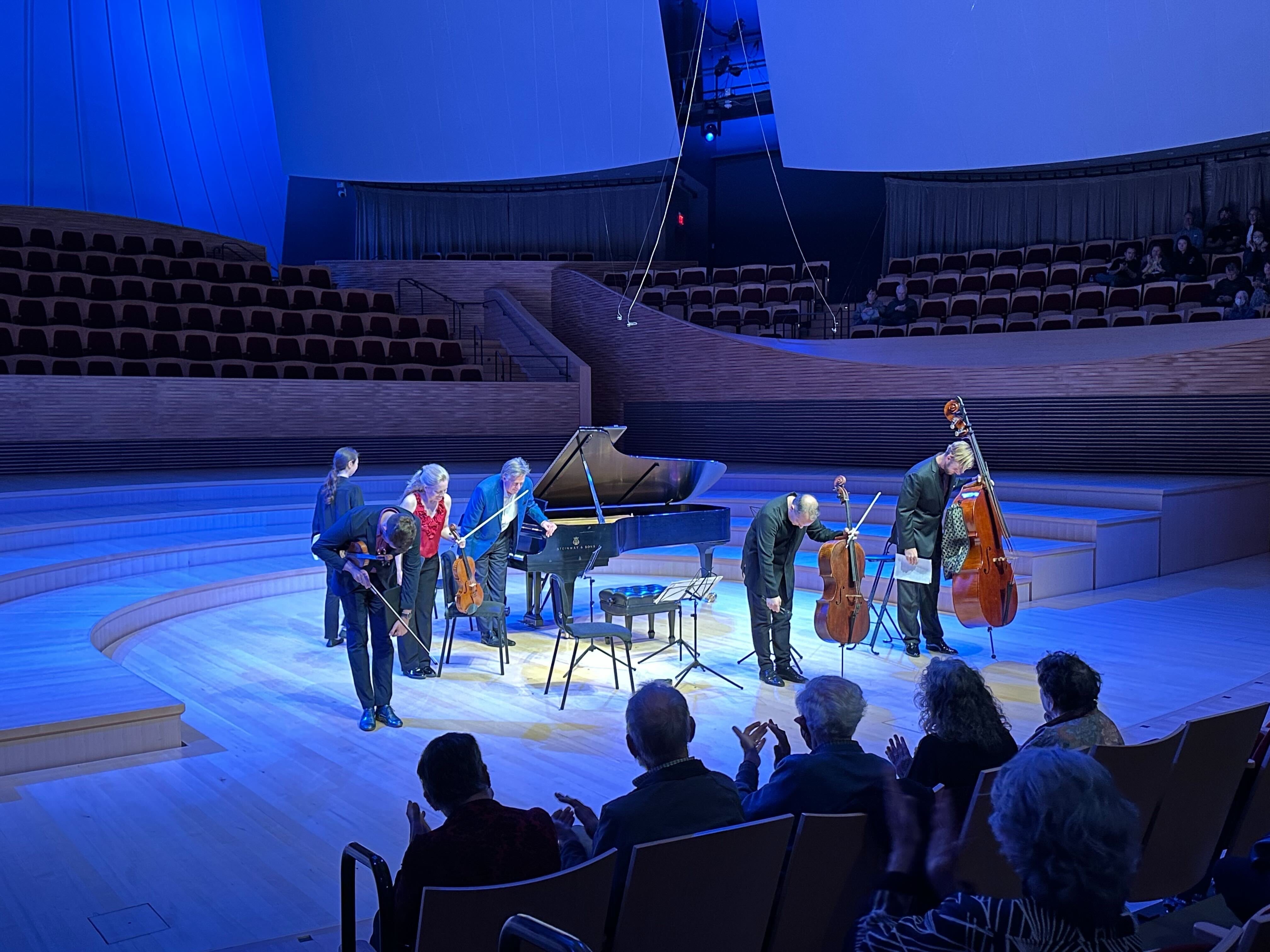Five weeks ago, I attended the St. Lawrence String Quartet’s Easter service concert, featuring Haydn’s “The Seven Last Words of Christ.” I went somewhat on a whim (my roommate was playing), and I enjoyed it as much as an undergraduate waiting to start his weekend could. Though I don’t remember much of the piece, I do remember the thought that hit me toward the end of it: Geoff would have loved this.
I can imagine this thought ran through the minds of many at St. Lawrence’s May 7 performance, the first “Sundays with the St. Lawrence” show since Geoff Nuttall’s passing last October. The quartet’s remaining members were joined by Visiting Artist Stephen Prutsman and San Francisco Symphony bassist Daniel Smith for a program of Mozart, Vaughan Williams, Lili Boulanger and Antonio Valencia.
This repertoire marks the beginning of a new era for the quartet. Their love for Haydn is well-documented; most of these semi-casual “Sundays with the St. Lawrence” have featured the composer in some light. With this program, they seem to have successfully begun charting a new path forward.
Nuttall was a founding member and resident first violinist of the quartet, and the impact of his death still weighs painfully on the musical community. All three St. Lawrence members — violist Lesley Robertson, violinist Owen Dalby and cellist Christopher Costanza — acknowledged Nuttall in their individual remarks during the concert.
It seemed to me that each of them shared their grief musically as well. St. Lawrence demonstrates perfectly what I call the “courage to be selfish”: that once we learn to play together in an ensemble, we must re-learn how to speak in our own voices.
Dalby shined with crystalline tone and laser-precise control — one of the concert’s highlights was his sultry slow vibrato in the encore performance of Dizzy Gillespie’s “A Night in Tunisia.” He spoke of “charting a new way forward” for the quartet, and his sound is certainly doing that. As the group’s newest member, Dalby is posed to determine the future of St. Lawrence; given his musicality, I have complete faith that the ensemble has bright days ahead.
Costanza embodies the steel in his cello strings, finding powerful and piercing sound to lift the others. He forms the sonic foundation of the quartet, but it also seems like he provides an emotional foundation in their transitional period. He brings a vital understanding of harmony and sonority to the table, and the performance benefited immeasurably from it.
Robertson presents both stylistic mastery and devastating affect in her playing. She is the core of St. Lawrence, uniting the violin and cello with her sound. Robertson brings out the best in every ensemble-mate, and she made me tear up playing a countermelody in the second movement of the Vaughan Williams quintet.
The ensemble’s collaboration with Smith is a new and welcome one. To be frank, the double bass doesn’t get much representation in chamber music, so I was surprised by Smith’s masterful blending and sensitivity with his instrument. The extended low C (four semitones below the typical lowest bass note) is one of my guilty pleasures, and Smith indulged us like midnight dark chocolate.
Prutsman, on the other hand, has worked with the quartet for more than a decade; his dynamic with the group is both attentive and effortless. While he seems to enjoy the part too much sometimes — overbalancing and rubato mismatch are common side effects — I believe the repertoire allows for it. Plus, Bing Concert Hall’s acoustics favor Prutsman’s piano over solo strings.
Chamber music offers pianists the widest range of color on the instrument: accompaniments can shout or murmur, and solo sections can sing or whisper. Prutsman paints with all of these in his performance. At moments, he motions with his hands as if to physically stop the piano’s strings like a guitarist. At others, he revels in its percussiveness.
Put simply, the five were spellbinding together. They imbued their program with more than just a love for music: they conveyed love for a supporting community, love for each other and love for a friend gone too soon. Though loss won’t define this group forever, its impact has given them a musical insight that I hope they never forget.
Editor’s Note: This article is a review and includes subjective thoughts, opinions and critiques.
